- Home
- Pat Barker
Double Vision Page 4
Double Vision Read online
Page 4
Robert’s house lay between the village and the forest. As they came out of the shadow of the trees, Stephen saw a grey stone farmhouse, appearing and disappearing with each bend in the road, fitting in so seamlessly with the surrounding fields that it scarcely seemed to have been made with human hands, but rather to have been thrown up by some natural process, like the granite boulders that littered the valley floor, left behind by a retreating glacier of the last Ice Age. Certainly it was less obviously a human artefact than the forest that crept over the hills towards it.
Robert turned up the drive and stopped in front of the house. Stephen got out, feeling surprisingly stiff, and stood awkwardly as his ten-year-old nephew, Adam, hurled himself over the threshold to hug his father. He didn’t seem to know when to stop, but simply crashed headlong into Robert’s chest. ‘Dad, Dad, I’ve found a badger.’
‘A dead one? Where?’
‘On the forest road.’
‘And you pulled him all the way back?’
‘I put him on a bin liner and dragged him.’ He was tugging at Robert’s sleeve to make him come and look.
‘Hey, hey. Say hello to Uncle Stephen.’
‘Hello,’ Adam said, but he was too shy to make eye contact and seemed to be hoping that if he didn’t look at Stephen he might disappear. ‘Dad.’
Robert let himself be tugged around the corner of the house and, not knowing what else to do, Stephen followed. A path led by the vegetable patch, where last year’s yellowing cabbage stalks stuck out of the muddy ground, white and flabby and marked at intervals with leaf scars like ringworm. A whiff of decay, which Stephen held his breath to avoid encountering, and then they were out on to a long sloping lawn that led down to a stand of trees – conifers of some kind, an advance guard of the invading forest.
The badger was sprawled on his back, legs splayed, a trickle of black blood running down from one side of his mouth. His fangs were bared, snarling at the car he’d seen too late. Bending over him, Stephen had the feeling that if you looked long enough into those golden eyes you’d see headlights on a road at night, just as earlier generations believed that a murderer’s image was preserved on the victim’s retina.
Robert knelt down on the grass and touched the pads of the front paw. ‘He’s still warm.’ He ran his hands across the thick pelt, frost-tipped hairs flattened by his hand springing up again as soon as it passed over them, as if they, at least, were still alive. ‘Poor old thing.’
Adam stood behind his shoulder, breathing heavily through his open mouth, excitement and the pride of discovery struggling with a sorrow he hadn’t known that he felt till now.
The January day was closing in. Stephen was intensely aware of them as three figures, three related figures, in a winter landscape, with the blank windows of the farmhouse behind them. Something to do with Robert’s hand resting on the badger’s pelt. His hand. Their father’s hand.
Even in this weather a column of ants was moving purposefully towards the trickle of blood.
‘He’ll keep overnight,’ Robert said, standing up.
‘Can you cut his head off, Dad?’
‘I don’t think so. It’s not that easy, cutting off heads. The neck ligaments are very strong.’
A machete would do it easily enough, Stephen thought, blinking the images away. Suddenly he wanted to be indoors, somewhere safe, away from the memories of long grass and the skulls you trip over in the dark.
‘Can’t we boil it?’
‘I think Mum might have something to say about that.’
Adam was squatting down, stroking the head. Stephen could see him lusting after the strong secret white structure underneath.
‘Let’s go and have tea, Adam,’ Robert said. ‘And I’ll see what I can do in the morning.’
He got Adam firmly by the shoulder and pushed him towards the house. But Stephen lingered for a moment, looking down at the badger, feeding off the raw power. Then, seeing Robert and Adam waiting for him by the patio door, he hurried up the lawn after them.
Beth was in the kitchen, beating oil and vinegar together in a bowl. She hadn’t so much aged since Stephen last saw her, as faded. Her features had blurred as if somebody had rubbed one of those enormous, squishy artist’s erasers across her face.
‘Hello, Stephen,’ she said briskly, offering her cheek to be kissed. ‘Have you seen the badger?’
‘Yes,’ Adam said.
Beth and Robert exchanged a glance above his head, the intimate, conspiratorial look of co-creators.
Robert said, ‘I think you’d better wash your hands, young man.’ He put a hand on Adam’s shoulder and steered him towards the door.
The adults stood around chatting, while Beth put the finishing touches to the meal. Odd, these meetings with relatives, Stephen thought. The long past stretching out behind you and yet, on the surface, a lack of things to talk about, the daily flotsam of life not available for picking over and comment. They talked about the spate of accidents on the railways, train delays, the foot-and-mouth epidemic that had devastated the local economy… And then, closer to home, how Beth was coping with her new job as a full-time hospital administrator. She’d only ever worked part time before, and she was finding the new job a strain. It took over an hour to get home in the evenings, so somebody had to collect Adam from school and stay with him till she got back.
‘It’s been better since Justine arrived. Mrs Todd just pulled out, no warning, and then Adam went down with chicken pox and of course I was going frantic, but then Robert remembered Justine.’ Beth dipped a ladle into the soup, her face open-pored and steamy in the heat. ‘And she’s been great, hasn’t she? Doesn’t do much housework, but frankly as long as Adam’s happy, I couldn’t care less about the housework. I can do that at the weekends.’
‘She’s very good with Adam,’ Robert said, taking the plates from under the grill where they’d been warming. ‘And he’s not easy.’
‘He’s not difficult,’ Beth said. She turned to Stephen. ‘Adam is a very, very rewarding child.’
Say no more, Stephen thought. He’d been a very, very rewarding child himself, in his day.
Beth served the soup. As they sat down at the table, Stephen asked, ‘Do you know Kate Frobisher?’
‘Yes,’ Robert said. ‘She was one of the judges for the Sci-Art competition, so I saw quite a bit of her for a while.’
‘What’s she like?’
Robert shrugged. ‘Cheerful. Down to earth. Loves her house. Of course, this was all before Ben died.’
‘That house is enormous,’ Beth said. ‘And she’s on her own now. I’d be terrified if it were me.’ She handed the bread round. ‘You knew Ben, didn’t you?’
‘Yes, quite well.’
‘I’m surprised you don’t know her, then.’
‘Ben didn’t spend all that much time in London. I have met her once or twice. But I’d like to use some of his photographs for the book, so I’ll need to go and see her.’
‘She lives, what, about five miles away?’ Robert said.
‘About that,’ Beth said. ‘Oh, and I think you might find her in a surgical collar. She had quite a nasty accident a bit back.’
‘But she’s all right?’
‘As far as we know,’ Robert said.
‘She is,’ Beth said. ‘I bumped into her in the hospital. She comes in for physiotherapy twice a week.’
All this time Adam had been sitting quietly, dipping hunks of bread into his soup but not eating much. He kept pulling at his ears like a much younger child, and clawing at his arms where a few chicken-pox scabs still lingered.
‘He’s tired,’ Beth said, following the direction of Stephen’s gaze.
‘No, I’m not.’
‘So you like animals?’ Stephen asked.
Not looking at him, Adam wriggled acknowledgement.
‘What kind do you like best?’
Adam thought. ‘Dead ones.’
‘He collects bones,’ Robert put in quickly. ‘Going to b
e an orthopaedic surgeon, I expect.’
Or a serial killer. ‘What’s the best one you’ve got?’
‘Human femurs. Dad gave them to me, didn’t you, Dad?’
Robert smiled. ‘Do you remember, Dad had them up in the attic? It’s amazing, isn’t it? You couldn’t be that casual today.’
‘I remember we used to play pirates with them.’
Even this shared memory brought with it a slight constraint. Robert had followed their father into medicine, whereas he’d gone off at a tangent, pursuing a career that nobody in the family had much respected.
‘You could show Stephen your collection,’ Beth said. ‘After tea.’
Adam nodded, scratching inside his T-shirt.
‘Don’t do that, you’ll break the skin,’ Robert said.
Adam kept still, until the adults started talking again, and then, out of the corner of his eye, Stephen saw him slide his hand inside the T-shirt and rub at his skin again. Poor kid.
After coffee, Beth went upstairs with Adam to put some kind of soothing ointment on the scabs. After she’d gone, Robert raised his eyebrows at Stephen. ‘Do you know, I think I might have a drink. Would you like one?’
‘If you don’t mind,’ he said awkwardly, ‘I think I’d rather have a bath and settle in.’
‘Yes, of course.’
Since Stephen had brought two suitcases and a laptop, Robert drove the short distance down the lane to the cottage. Frost glittered on every twig of the hawthorn hedge that enclosed the small front garden. Stephen stamped his feet, breath pluming round his face, while Robert bent to unlock the door. Above their heads, bare branches netted a shoal of stars.
‘You haven’t brought much with you,’ Robert said, looking at the cases.
‘No, well, I didn’t leave home with much. Nerys’s storing most of it.’
‘Oh, so it’s pretty amicable, then?’
‘Huh! I don’t know about that.’
They went into the hall. ‘You’ll find a few basic things in the cupboards. The fire’s been on all day, so it should be warmed through.’
A low door led into the living room, so low that even Robert, who was a couple of inches shorter than Stephen, had to duck to get through. Stephen bent his head and followed.
A stone fireplace, a huge fire blazing in the grate, logs piled high in baskets on either side.
‘You can buy more logs,’ Robert said. ‘There’s a sawmill just up the road, about three miles, but there’s a coal-house round the side’ – he gestured vaguely – ‘and you’ll find enough there for a couple of weeks.’
The log on the fire had burnt almost to ash, its side creased and cracked like elephant skin. Robert bent down and put another log on top of it. Sparks flew up, and for a moment his face became a bronze mask, and then, as the green wood spat and smoked, darkened to grey. He stood up, scuffing wood chips from his palms.
‘This is ideal,’ Stephen said, looking round.
‘You should be able to work, at least. It’s quiet enough.’ He seemed to be debating whether to say anything more. At last he said, ‘Stephen, are you all right?’
‘I’m fine, Robert, honestly. Just a bit tired.’
They looked at each other, slightly awkward, aware of the silence, then somewhere at the back of the cottage an owl hooted. As if this were a signal, Robert said, ‘I’ll leave you to settle in.’
Five
As soon as Robert had gone, Stephen looked all over the cottage, feeling a surge of pleasure as he took in his surroundings. Despite the fire there was a chill in the air, but then the cottage had been standing empty for a year, the foot-and-mouth epidemic having destroyed the market for weekend breaks.
A small kitchen and, upstairs, a tiny bathroom. In the front bedroom there was a desk and chair, useless for writing, at least in their present position, because they were too close to the window. Flying glass. He’d always felt bizarrely safe in the Holiday Inn in Sarajevo because the glass in the windows was long gone. He would lie curled up, fingers thrust into his armpits, hoarding warmth, and listen to the pitter-patter of rain on the polythene sheets that divided him from the thudding sky, until the mingled sound of rain and small-arms fire became a lullaby. He missed it when he got home. Surrounded by leafy trees and the hum of London traffic, he’d found it impossible to sleep. At the time he’d preferred to regard this as a personal quirk rather than as a symptom of post-traumatic stress disorder. He still did.
The back bedroom was larger. He stood at the small, ivy-fringed window, looking out over the garden. A patch of lawn, shrubs, a path leading down to a gate and beyond that, on the crest of a hill, a copse of deciduous trees. Bare branches clotted with rooks’ nests stood out against the smoky red of the sky.
He took off his trainers, shirt and jeans and stretched out on the bed, telling himself he couldn’t possibly sleep, and, almost immediately, slept. Once, he jerked awake at a sudden sound – the creak of a floorboard perhaps? – but the sound wasn’t repeated and he made himself relax. Somewhere near by an owl hooted, and he waited for the scream of a small creature finding dusk turn to night in the shadow of immense wings. Nothing. The owl hooted again. It must have a nest up there among the trees.
Drowsily, he tried to catch the words that were drifting through his brain. Something to do with owls being restless in a place where people had met violent deaths, but he couldn’t remember, and anyway it was nonsense, nobody had died here, or only in their beds of sickness or old age. No violent deaths since the union of England and Scotland brought the long centuries of border raiding to a close. No skulls in the grass, no girls with splayed thighs and skirts around their waists revealing, even in the early stages of decomposition, what had been done to them before they died. No smell of decay clinging to the skin. Just a square of window fringed by dark leaves. He closed his eyes, and the window became a pattern floating on the inside of his lids, turning first to orange and then to purple before fading, at last, to black.
His sleep was threadbare, like cheap curtains letting in too much light. He woke, slept, turned over, slept again, and then woke finally with a cry in the blackness, disorientated, thinking he could hear the patter of rain on polythene.
But there was no sound of rain at the window, so the pattering must have come from his dream. Brutally awake now, he started to think about Ben, as he’d known he must sooner or later, coming here to Ben’s home ground.
It had been raining that night in Sarajevo, heavy showers falling as sleet and blown across the road. The cold hit him as he came out of the television centre and stood, upright and exposed, on the steps leading down to the street. The snow was pockmarked under his feet. He took a deep breath, dragging cold into his lungs, and was about to step down into the road when he heard a sound behind him and turned round to see Ben Frobisher come out of the swing doors behind him.
‘Do you mind if I tag along?’
Stephen did mind, but it was too late to say so. The armoured car had gone, and there was no other way of getting back to the hotel. He was secretly furious: the whole point of this walk was that he should do it alone.
They stepped out into a world so dark their faces and hands seemed to give off the only light. Far away on the horizon the flickering artillery rumbled. A flare went up, and, for one trembling second, the roofs were edged in blue, then darkness fell again, deeper than before.
Despite the cold, he started to sweat, raising his gloved hand to wipe his upper lip. The flak jacket and the body armour encumbered his movements, and he was aware of Ben walking in the same robotic way. They passed graffitied walls whose scribblings they couldn’t read, and then a block of flats with all its windows shattered, shards of glass lying in the slush around the chained gates. Despite the chains, people still lived here. He was aware of eyes all round them, of ears straining to listen as their feet slithered through the slush. In places the snow covered pieces of rubble. He was intensely aware of Ben, of the gleam of his eyes and teeth, of his body as a sour
ce of heat in the cold dark, almost as if the brain, deprived of vision, developed a kind of thermal-imaging technique. Far away to the right, in the darkness, snipers waited for somebody desperate enough for heating, or water, or food, to break cover and step out into the road.
As they approached the crossroads, he turned in his lumbering moon walk to Ben and pointed him deeper into the shadow of the building. Scuffing their shoulders, they scaled along the wall, then stopped for breath, side by side now, leaning against a door while they nerved themselves to face the dash across the open road. For two or three seconds they would be dark shapes against the glimmering whiteness.
‘Well?’ Ben whispered.
Stephen nodded, and braced himself against the door, which gave way under his weight so that he staggered back into the stairwell of the building. Ben followed, stopping when he was safely inside to examine the lock that had been smashed.
A flight of stairs led up into the dark. A scuffle from above, a sense of pricked ears and eyes watching. Ben produced a torch from his pocket, cupped his hand around the light, and shone it over the walls, so that they saw the dank passage and threadbare carpet veiled in his blood. His fingers were dark shadows in the ruby skin, like an X-ray, Stephen thought, and that red glow spread over the walls. Splinters of glass lying on the stairs had been crunched to a fine powder in the centre of the treads. Upstairs, the scuffling started again.
‘Up there,’ Ben whispered, pointing. He started to move towards the stairs.
Stephen caught his arm. ‘No, come on, leave it.’
Ben pressed on, not shaking him off, just quietly disengaging himself. Reluctantly, Stephen followed.
A smell of mould met them at the top of the first flight, and the red torchlight revealed fungus growing on a damp patch of plaster. Then other smells took over: the musty smell of old carpets covered in dog hairs, the burnt toast smell of dried urine on mattresses, and finally a smell Stephen fought against recognizing.
In a corner of the landing, away from the danger of flying glass, a girl huddled on a mattress. She didn’t speak or cry out or try to get away. Ben swung the beam along the wall until it found her face. Eyes wide open, skirt bunched up around her waist, her splayed thighs enclosing a blackness of blood and pain.

 Border Crossing
Border Crossing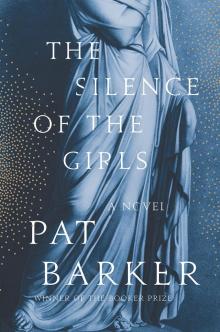 The Silence of the Girls
The Silence of the Girls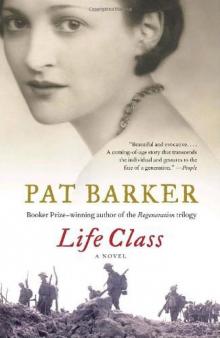 Life Class
Life Class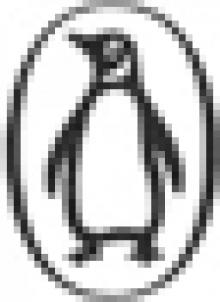 Regeneration
Regeneration Another World
Another World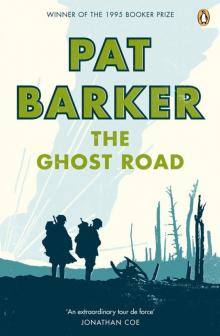 The Ghost Road
The Ghost Road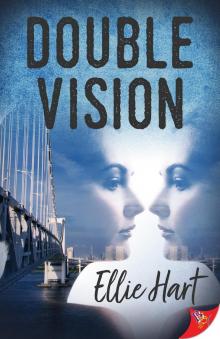 Double Vision
Double Vision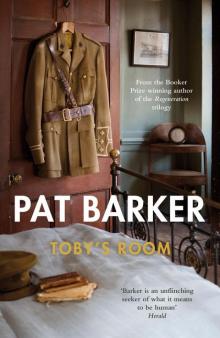 Toby's Room
Toby's Room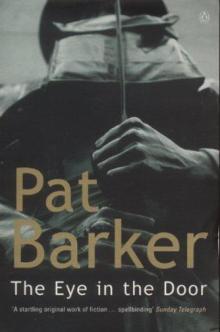 Regeneration Trilogy 02 - The Eye in the Door
Regeneration Trilogy 02 - The Eye in the Door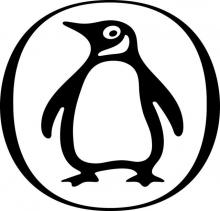 The Eye in the Door
The Eye in the Door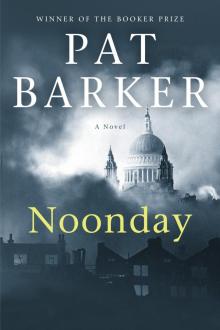 Noonday
Noonday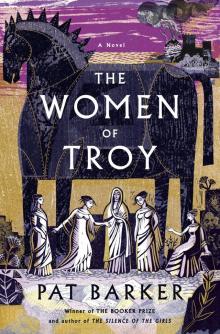 The Women of Troy: A Novel
The Women of Troy: A Novel